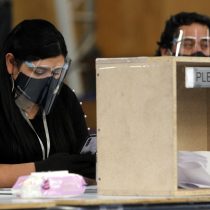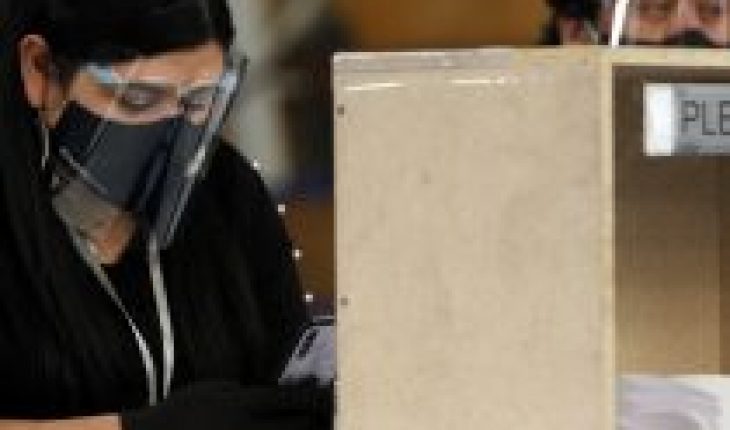
A real bucket of cold water was the one launched by Interior Minister Victor Perez closing the door to the vote of people infected with Covid-19 in the next constituent plebiscite of October 25. Although the Electoral Service (Servel) and even the RN President of the Chamber of Deputies, Diego Paulsen, had pointed out during the morning that there was room to legislate on the matter, The Coin ruled out the possibility.
“Carrying forward legislation to modify substantial aspects of our electoral system within 60 days of the electoral act is absolutely unworkable(…) are health reasons that the health minister will make known to you, and that resolution by the health minister we all have to abide by,” the chief of staff said this afternoon.
During the morning, the chairman of the Board of Directors of the Servel, Patricio Santamaría, insisted on his proposal for a home vote for people with Covid-19 and was confident that there is still room to legislate. “If I were asked, I would make the effort to do so,” he said, along with warning that “some issues have been legislated in 24 hours here.”
In a similar tone, Diego Paulsen (RN), president of the Chamber of Deputies, was available to move forward on this issue, noting that “we can legislate from Monday to Sunday”.
However, in La Moneda they have no intention of innovating on the matter, and the Minister Secretary General of the Presidency, Christian Monckeberg argued that “from a practical point of view, it is always possible to issue a law, but we are less than 60 days away from an election. The law may be the easiest mechanism to carry out. The point is to implement that procedure because the vote has to be secret.”
“We are less than 60 days from the plebiscite and difficulties can put uphill such an implementation,” he said.
Congress insists on legislating
Despite the Executive’s stance, from Congress they insisted on legislating this issue, a proposal that ranks even in the ranks of Chile Vamos.
This is how Senator RN Francisco Chahuán questioned the Government’s position by pointing out that it might be unconstitutional to take away the right to defray these people.
“We regret that the Government has closed the door to the possibility of legislating on the postal vote for those who are infected with Covid-19 and who wish to vote in the plebiscite of 25 October, we have to guarantee the constitutional right to suffrage, especially in view of the views of Servel itself that call on the Government to send an express law, remember that we have already presented a project on this nature and hope that it will have the legislative urgency, so we hope that the Government can review its position,” Chahuán said.
The parliamentarian said that the constitutional reform that entered on 26 August and which is in the Senate’s Committee on The Constitution, Legislation and Justice, would allow the postal vote in a state of health crisis.
“Disaffected by democracy”
In the opposition, PPD head of banker Raúl Soto said that “it is an irresponsibility of the Government to refuse to generate a safe alternative for people infected with #COVID to vote, when there is opening of the Servel and Parliament to legislate with a sense of urgency in this matter.”
Meanwhile, PPD Sen. Guido Girardi, a member of the Senate Health Committee, lamented “the Executive’s disaffection of democracy” and announced that he will send a bill to implement remote voting, “whether by mail, internet or mobile ballot box.”
In this regard, Girardi said that “it is unfortunate that the Government again turns its back on the public, just as it did with the 10% on which it drove a real campaign of terror by saying that it could not be and that it was going to cause an economic catastrophe and none of that has happened (…) now they don’t want to guarantee people’s human rights such as voter turnout. If the Government does not want to do it ourselves, we will introduce a bill for the appropriate measures to be implemented and all Chileans, without exceptions, can comply with their civil law if they wish to do so.”
Deputy Diego Ibáñez (CS), meanwhile, insisted that the mail vote “must be implemented”. “The government does not have the pandemic under control and refuses to alternatives that favor participation.
There is extensive international experience in implemenvote by mail and it is possible to prioritize population groups that benefit most from the measure to implement it on a viable scale,” he added.





